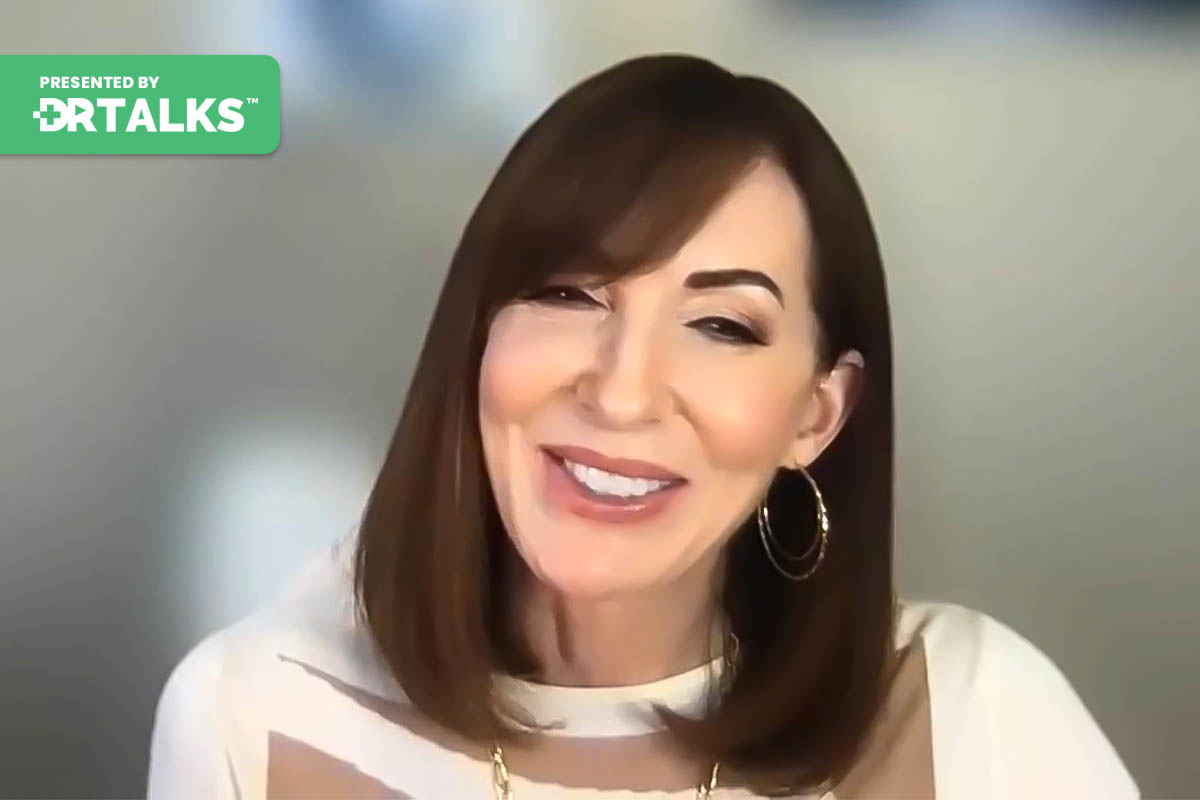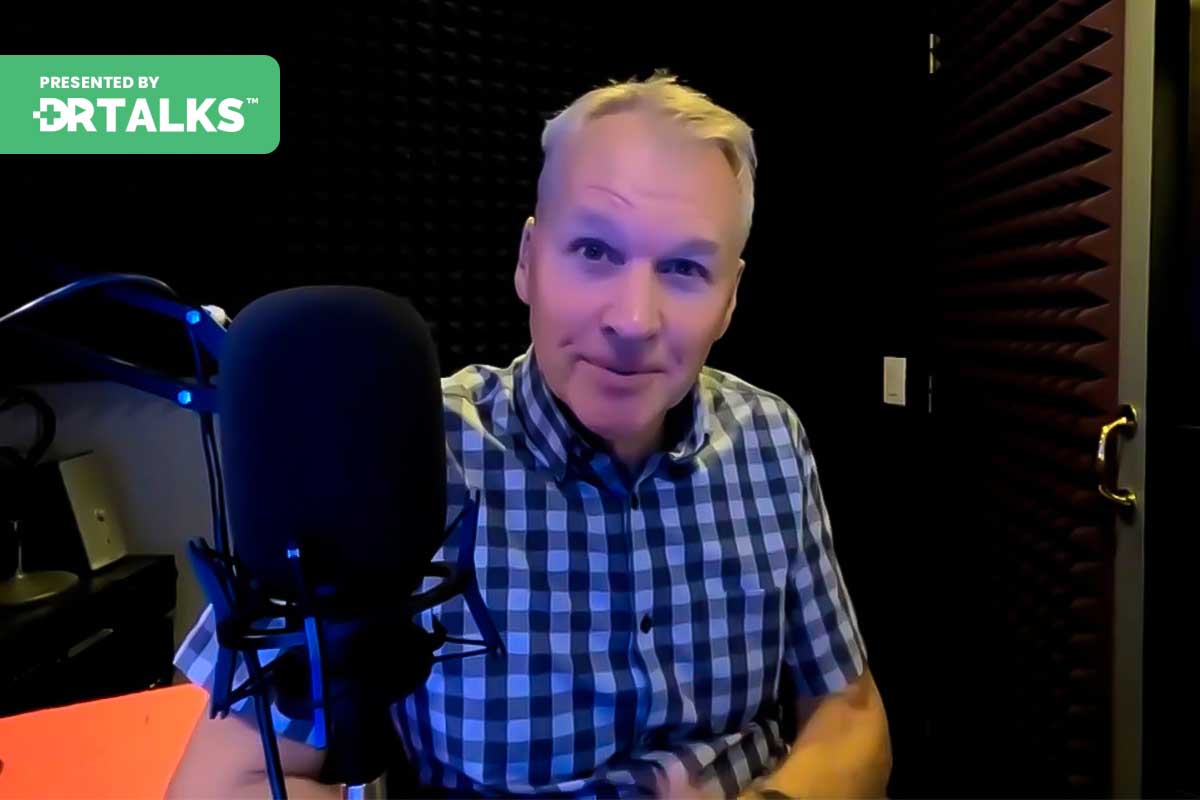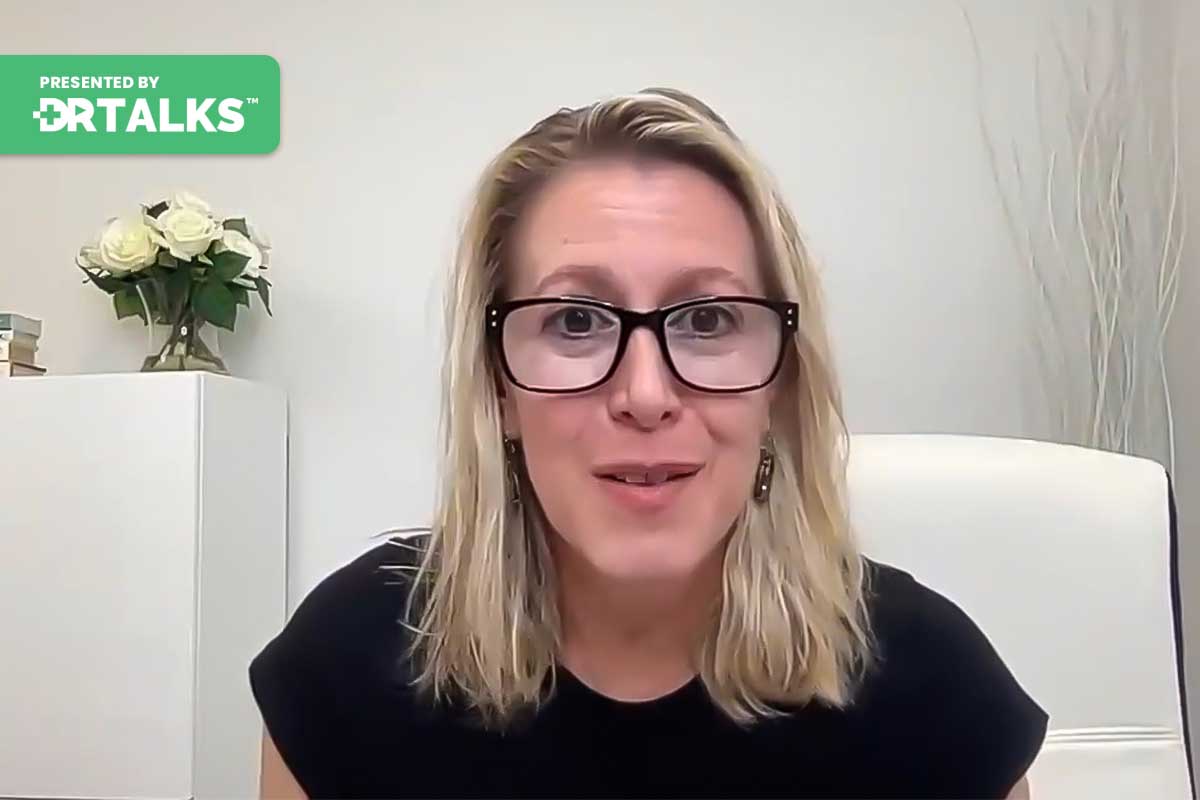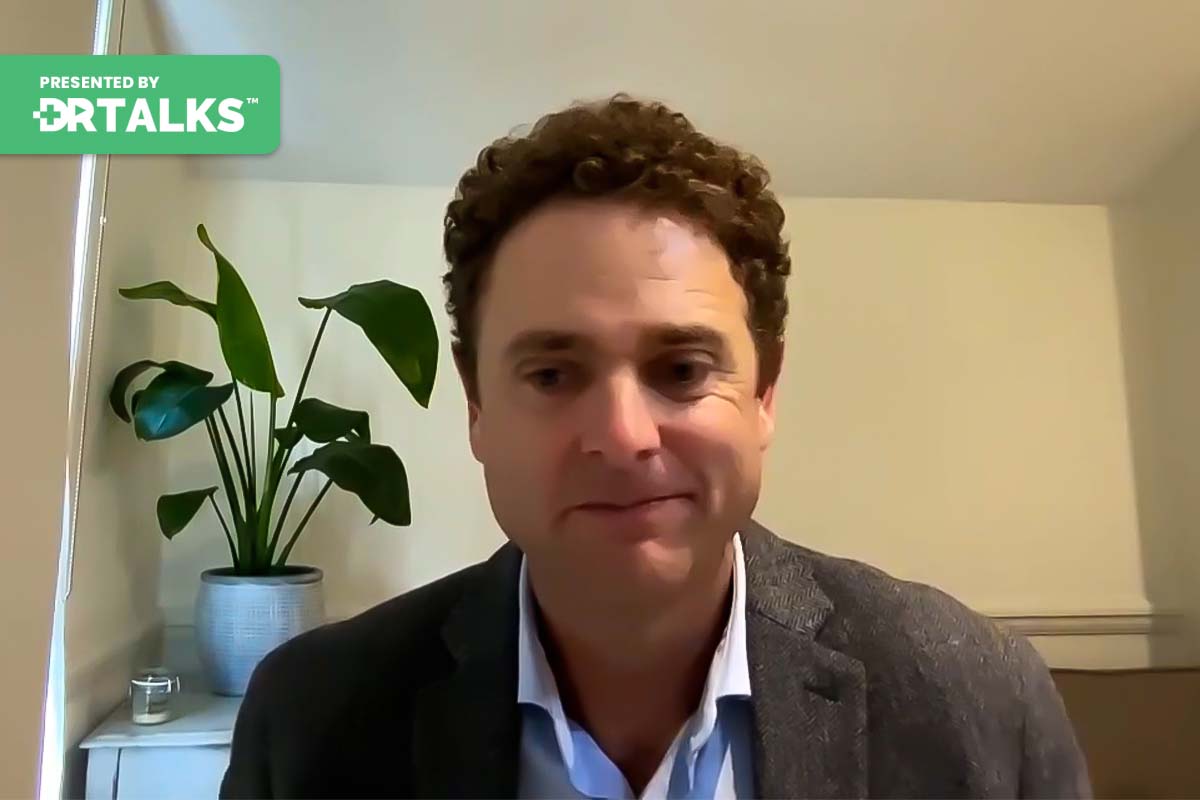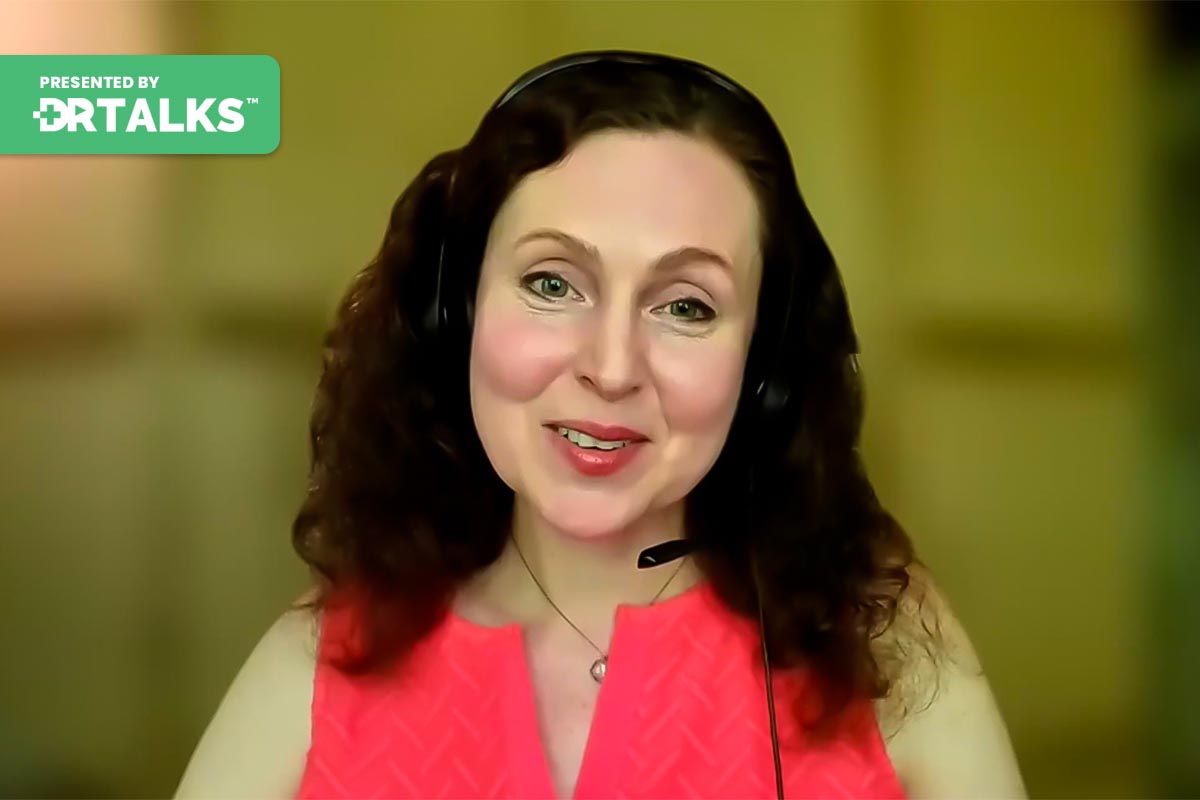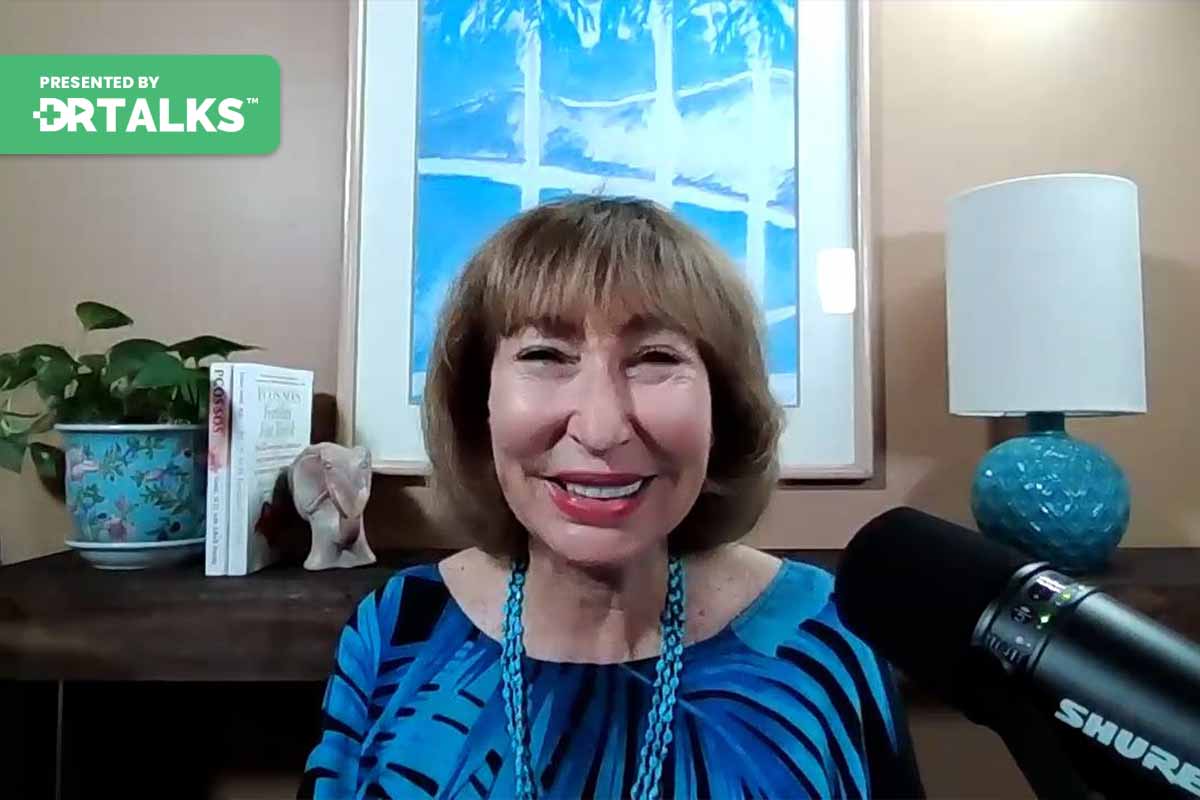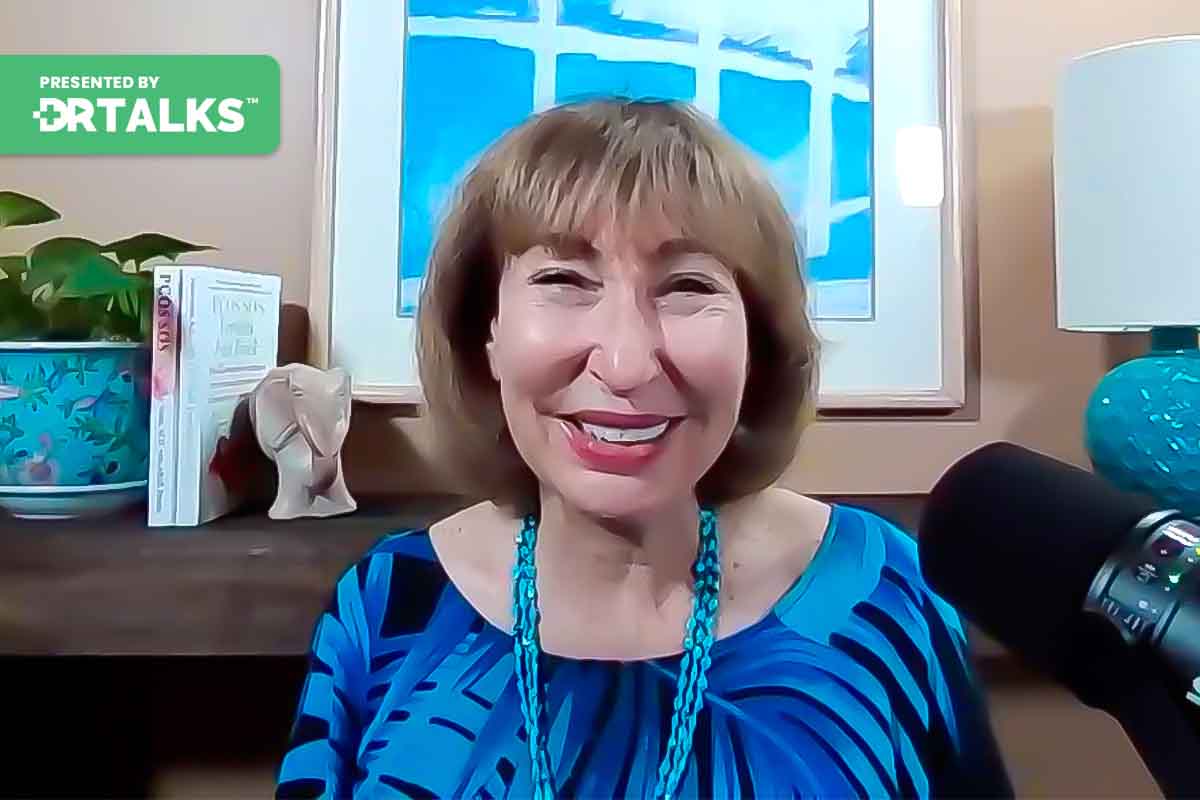Join the discussion below
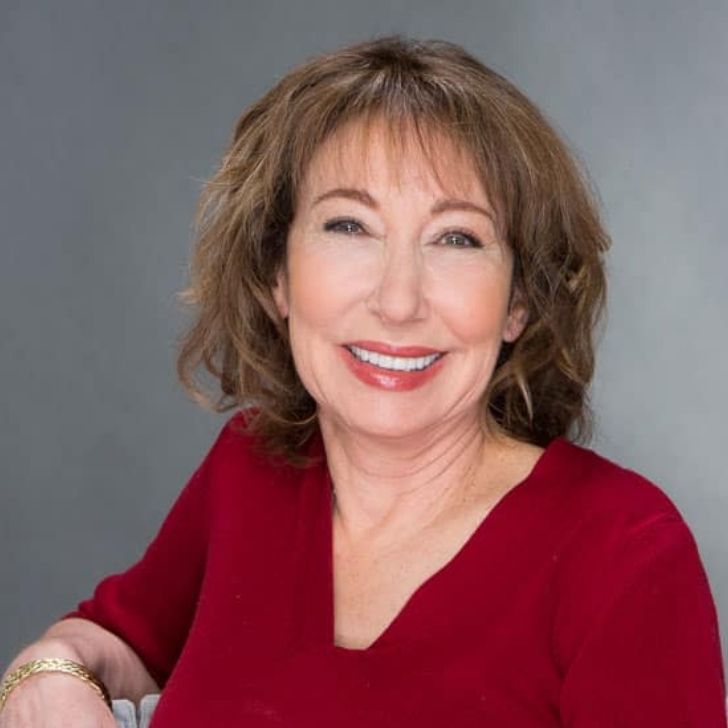
Felice Gersh, MD is a multi-award winning physician with dual board certifications in OB-GYN and Integrative Medicine. She is the founder and director of the Integrative Medical Group of Irvine, a practice that provides comprehensive health care for women by combining the best evidence-based therapies from conventional, naturopathic, and holistic... Read More
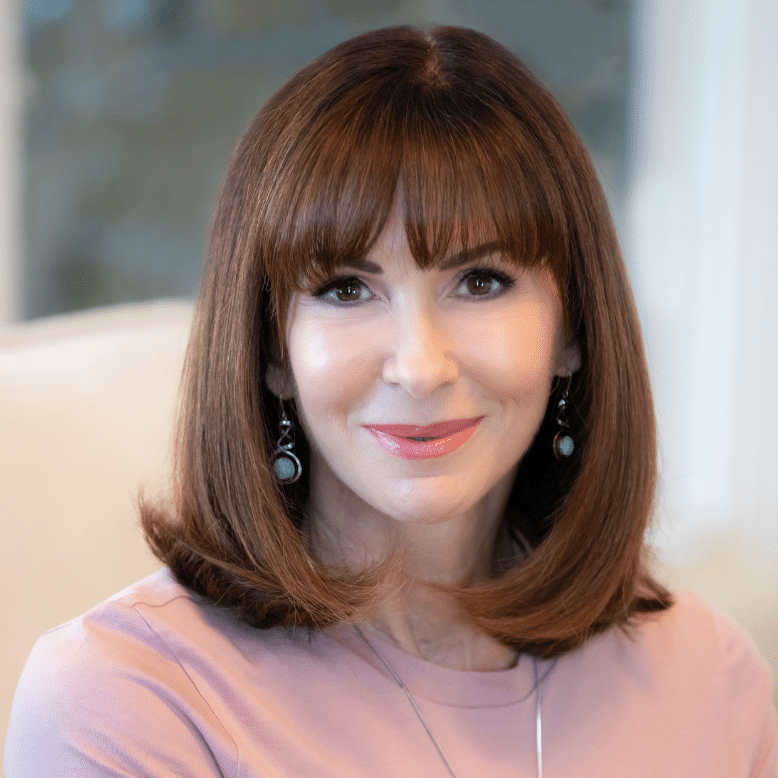
Tana Amen is a New York Times bestselling author, vice president of the Amen Clinics, a neurosurgical ICU trauma nurse, and a world-renowned health and fitness expert. She has won the hearts of millions with her simple yet effective strategies to help anyone optimize their lifestyle and win the fight... Read More
- Discover the connection between hormones, PCOS, and mental health from personal experience
- Understand the significant role of nutrition in managing PCOS and its effects on mental health
- Learn how a balanced hormone profile can influence mental health, particularly in individuals with PCOS
- This video is part of the PCOS SOS Summit
Related Topics
Acne, Connection, Diet, Energy, Exercise, Hormones, Menstrual Irregularities, Mental Health, Metabolic Dysfunction, Metformin, PCOS, Recovery, Supplements, Testosterone, Treatment, WeightFelice Gersh, MD
Welcome to this episode of the PCOS SOS Summit. I’m your host, Dr. Felice Gersh. With me for this episode is a remarkable woman. You’re going to love all of this interview and all she has to share with you. It’s Tana Amen. She is a world renowned expert in health and fitness. She’s the vice president of the Almond Clinics, which is also world renowned for their care involving many aspects of health with a focus on psychiatric illness. And she, in addition, is and this I just learned fairly recently. She is a neurosurgical ICU trauma nurse. So talk about wearing many hats. So welcome, Tana. Thank you so much for joining me. And I can’t wait to hear your your own story, how you actually navigated your own journey with PCOS and all you have to offer from all your experience and your training. To share with our audience. So many women with PCOS. So first welcome and please tell us your story. I know it’s fascinating.
Tana Amen, BSN, RN
Well, Dr. Gersh, thank you so much. And I just have to say, like, I’m so honored to be here with the PCOS queen herself, like the expert. So you have been just so instrumental and helpful to people in my own family. So I just to be here with you. That’s quite the honor. So thank you. Yeah. PCOS has been an interesting journey for not just me, but many of the women in my family, my daughter, my mother. It’s been a challenge. And I didn’t know until I met you that there were different kinds of PCOS. So that was a very interesting thing for me. But I’ll stick to my own journey for the moment and not knowing that I had PCOS when I was young, having a lot of the symptoms that I understand now, went to the doctor and as is typical, was put on birth control. Right. It’s like a Band-Aid. Band-Aid over a bullet hole. And you don’t know they’re there for a little while. And then some of the symptoms just continue to get worse. But also, birth control didn’t really sit well with me. It made me very emotional. It made me moody. I had all these other issues. Then at one point when I went off of the birth control, all those symptoms would come back minus periods. There were no periods, but there were all these other symptoms, right? So I was having all of these other problems. Then I go back on birth control, mask everything, wouldn’t know it was there. And this was going on for a while until I tried to get pregnant and couldn’t get pregnant. You would think at that point that was when they found it, but they did not. Took me four years. I finally got pregnant. They just basically said I had fertility issues and I kind of gave up. And so then I got pregnant. And it was when I finally went off birth control for like completely that was when I was diagnosed. I finally saw a functional medicine doctor because I thought I was going into early menopause. I was 37 years old, had acne like crazy. The trick was I was not overweight. I was actually very lean. I was very into working out very fit, probably over working out. And so like I was doing too much exercise, very lean, and but I was having no periods, moody, a little bit anxious and difficulty committing, if you will, almost had like very masculine energy. And so I went to the doctor and I’m like, I’m going into early menopause. Like, I just it’s like I need to do something. She ran a couple of tests within just a very short time. She said, You’re not going to do early menopause. You have PCOS. It’s been undiagnosed for all this time. And it was completely life changing because like all these years, it explains so many things that have been going on in my life that I just had no idea. And that was where I began my journey into. There were many a couple of major things that coincided that led me on my health odyssey. That was one of the big things.
Felice Gersh, MD
Well, now let’s go back a little bit and just share with everyone the various symptoms, like you mentioned, acne. Like just go through the litany of symptoms that you were dealing with and then try to figure out how did this get missed? You know, like were you classical except for being thin or like this? Tell us, what actually were you experiencing?
Tana Amen, BSN, RN
So when I yes. So when I was younger, I had probably not severe acne, but I had acne. So what did they do? They put me on Accutane and birth control is what everybody does, right? Accutane and birth control, which, by the way, made me incredibly anxious and depressed. Just going to throw that out there. So I’m not telling anybody not to do it. I’m just saying it made me incredibly anxious and depressed. Everyone thought that was fine, but yeah, the acne cleared up, you know. So then fast forward, I had perfect skin all the way through until I went off of birth control. Acne comes back. So that was one of the big things was the acne mood swings my weight when I was younger, I was never overweight, but I definitely put on, I would say, you know, 5 to £8. And the one thing I never had and it might be one reason that they didn’t look deeper into it. Well, back then, they didn’t really look at it as much, but I never had that sort of hair on the face and I was never really overweight. So those were the two big Hallmark things, I think, that kept them from looking deeper into it. They just said, Go on birth control. It’ll straighten everything out. So even as an adult, when I went off of birth control, I didn’t get the weight gain or the hairy. I actually do have a lot of hair on my face, but not that sort of more masculine where it was like a beard. So I think those were the two things. But I but I always had the one I didn’t know. And this is something that became really important and interesting to me as I started doing coaching. There’s a much higher prevalence of misdiagnosis or shall I say, women being diagnosed with mental health problems like depression, anxiety, bipolar disorder that have PCOS. Now, some of them like I would think someone would make that correlation and go, Oh, this is important, we should check. But this just hasn’t been that way. So when I look back at some of my own issues with anxiety, trouble committing when I was younger is like as soon as I got my hormones straightened out, I was like, Oh, no, I’m nothing, you know? It’s just very weird. I just had trouble settling down. They’re just very interesting symptoms that I had. My husband still jokes about it that that I was like, more like a guy where I just couldn’t like I was very driven, very intense. I was very intense and driven. I had to work out really hard just to sort of get I always said to get my energy out, you know, to get that that intense energy out. So those were some of the some of the symptoms. But when you look at labs, some of the other symptoms were that I had I was lean and working out hard and I had a high hemoglobin onesie. So I was actually on the border like I was borderline insulin resistant. My cholesterol went very high. I never had high blood pressure, high cholesterol. And then when she did test me, she did an ultrasound. And I apparently I had lots of little follicles that were, you know, not mature. And so that was one of the Hallmark signs. And so I had all of these things coming together. That was how she diagnosed me with PCOS.
Felice Gersh, MD
I think it’s so important for people to realize the great spectrum of presentations involved with PCOS that you can be lean and you can have metabolic dysfunction because that’s what you’re describing with your cholesterol, with your hemoglobin A1. C And now we know that menstrual irregularities are sort of a a prophecy of future problems to, you know, from a cardio metabolic standpoint and also the mental health aspects, which is huge and you were really impacted by that. So now you’re finally diagnosed. So what happened next? How what was your treatment and recovery journey like?
Tana Amen, BSN, RN
So it’s interesting. I know it’s not necessarily like there’s so many I think functional medicines come so far. I know a lot of women who never they don’t put them on metformin or anything like that. But for me, with all of my other symptoms and the fact that I had cancer, the decision was made to put me on metformin as well as some supplements, as well as actually cutting back on my exercise, which was really weird for me. But they cut back that she’s like, You’ve got to sort of settle down. Your cortisol is too high. I had this lot going on, so when I cut back on exercise, I actually started to feel better. I started to sleep better. They put me on the metformin. That was a hard adjustment for me because the metformin lowered my testosterone. Ultimately like my weight, along with changing my diet, my testosterone started to decrease, right? But as my testosterone decreased, I was so used to being so driven all the time, but my husband was like, wow, like you’re so like, you’re so nasty and cuddling now. Like, you’re so like like I want, like, I love whatever’s happening. I’m loving this. I’m, like, really? Because I hate it. Because my muscles feel softer. I feel like I’m not my energy is not the same. And I remember going to the doctor and going, Something’s not right. I think I’m on too much of this stuff. Like I don’t feel I don’t feel normal. She’s like, No, your labs look amazing. Like, everything was falling into place, the acne was gone. And so I’m like, this. This can’t be right. Like, I don’t have the same drive. And she’s like, Yeah, this is called being a woman. This is like. So I had to sort of adjust my mindset of what feeling normal was like. And now I look back and I’m like, Wow, I must have been really a royal pain in the you know what, for everyone around me, because I was just like couldn’t settle down. And now I’m very different. Like, I’m just much more I wouldn’t say around and I’m still very young in my energy, but not to the same degree. And so but I changed my diet completely, went on some simple supplements. And I know Berberine is a big one that helps. And so but at the time that’s what they put me on was metformin.
Felice Gersh, MD
Well, metformin certainly can have tremendous benefits for for many women and for you, it really turned out to be like a miracle drug.
Tana Amen, BSN, RN
It really.
Felice Gersh, MD
Wasn’t. It real? It really was. And, you know, there’s just everyone’s unique. That’s what’s so perfect about functional medicine is not doing the cookie cutter approach. That’s and that’s why, you know, I talk about myself. I’m not an alternative medicine doctor. I’m an integrative. So I don’t, you know, like criticize, you know, say never use pharmaceuticals. Pharmaceuticals have a place. And, you know, sometimes it can be lifesaving. Of course. So now you became fertile, even more fertile. Correct. And you what happened with your pregnancies? Did you end up having gestational diabetes or pre-eclampsia, any of that sort of complication?
Tana Amen, BSN, RN
Well, it’s funny that you mention that, because when I was pregnant took me four years to get pregnant. And when I was pregnant, they did test me for gestational diabetes. And what’s interesting is I didn’t have it, but they wanted me to be really careful. No one ever, ever pointed out that that might have been the that that might be the correlation. No one said anything to me about that. So it was like I felt like it was my fault. I’m like, I’m eating wrong, my doing something wrong. No one ever like, pointed out that this could be the part. Like, there was a correlation to PCOS or my hormones. Nothing. Nothing. So and I was a nurse, so it was very weird for me because I don’t, I never really understood PCOS So it was when I was diagnosed, I really began to understand which by the way, that was a big thing because you mentioned like what I did and what I, what I, you know, some of the things I did, I didn’t know a lot about nutrition, even though I was a nurse and I went to Loma Linda where nutrition was a big thing, but they’re sort of their version of what is healthy. I knew the basics, but I thought because I was thin, because I was really, really fit, that I could eat whatever I wanted. And so it wasn’t until I was diagnosed with PCOS and put on metformin and I went where I’m not sure I like this idea of going down this road of like just layering more and more meds. I have to take several meds because I’ve had several major health crises with like cancer and you know, those things. But I don’t want to just add meds I don’t need. And so at that point, that’s when I decided I need to understand, like what? I’m not taking insulin like this. Just no, I’m not going down that road right now, like kind of freaked me out because my grandmother had to do that. My grandmother had diabetes. She dying from the complications of diabetes. So it really woke me up. It was a wake up call. That’s what I really educated myself and started writing. I’ve written multiple books now on the impact of lifestyle and nutrition and your overall health with inflammation and things like PCOS and all of these things. And by the way, it’s like the same diet, right? It’s the same concept for all of it. But that’s where I really began to understand that what I was eating was really making a big difference. So not in a good way.
Felice Gersh, MD
So you learned so much about medicine through your own personal journey, and now you’re sharing that with many clients all over the world. So tell us a little bit more about what you now are teaching, you know, and coaching in terms of lifestyle and fitness, nutrition and how you blend all of these things together and and where do you start when someone is clearly in a state of metabolic disarray there, this person will say is overweight, has irregular cycles, has mood swings, you know, infertility and, you know, just doesn’t know where to even begin. So how do you help transform this life, this woman who really needs your help?
Tana Amen, BSN, RN
So I’m going to start by saying I trained at a forum, which you were one of the people that I met there and trained with. So I really one of the major things I don’t have to have all the answers. You have to know where to find the answers. And that’s what I’m trying to tell people. But this is like the thing I love about functional medicine. Like you said, it’s not anti medicine. We’re just like even at our clinics, we’re against the indiscriminate use of it or using the wrong medications for the wrong person. But what we want to do is we want to use the least toxic, most effective things, the most natural we can do. But what is more important than all of that is getting to the root cause, the birth control for me was putting a Band-Aid over a bullet hole. And I know some doctors hate when I say that, but that’s what it felt like for me. Nobody was trying to get to the root cause. Why are you having these issues? What is beneath all of these symptoms? What is triggering all of this? Like, right, let’s go upstream a little bit. And so as opposed to let’s just treat the disease, let’s just treat the problem that’s happening with symptoms that are happening right now. So that’s why I like functional medicine. So what I try to tell people is I point them in the right direction. If you are having depression, you need to get your important numbers checked, you need a thorough assessment. So we never want to treat a symptom. We want to treat a person, right? So that at our clinic, that’s how it is we’re going to get a thorough assessment on the brain. Skin is like a tiny part of what we do. So people think it’s everything we do. It’s not we want it. That’s a map. It sort of shows us what’s going on. But are you underactive, overactive, inflamed, whatever. We’re also going to run a lot of labs and we’re going to probably send you to someone like you if you’ve got, you know, female issues going on, what we suspect to be whatever, PCOS or something else happening. We’re going to send you to an expert. We want to get to the root cause of what’s causing your depression, your anxiety. We don’t think that those are diagnoses, those are symptoms. So we want to know why. Why are you depressed? Why are you anxious? Why are you having brain fog? You know, did you have a head injury? Is it overactive? Is it underactive? Do you have an infection? Are your hormones out of balance? So really, that’s where we start. I don’t think you can go anywhere until you do that, until you get a thorough assessment, lots of labs, you want to look at the numbers, you want to talk to the person, see their history, and then you start from there and it’s like a little scavenger hunt. You’re going on a scavenger hunt and you just have to like sometimes have to be a little patient.
Felice Gersh, MD
Well, I love that approach, of course, and recognizing that you can have similar symptoms, but they stem from different ideologies. And when you say something is a syndrome, like PCOS is a syndrome, that’s just a grab bag for all kinds of, you know, etiologies that are manifesting in somewhat similar ways. So when you look at the myriad issues with with PCOS, so do you start in terms of collecting all this data, looking at some of the nutritional profiles, inflammation markers, what are some of the lab tests that you would recommend sort of as a routine?
Tana Amen, BSN, RN
So all the basics. So all the basics that I think most doctors would check, you know, a CBC to look at your how your your blood looks and what’s going on with all of that. But, yes, we look at things like inflammatory markers. We look at that for almost everything. So because inflammation is actually one of the causes of almost all chronic illness in people, it’s a correlation with all chronic illness. And I don’t think most people realize that. So we talk so much, we throw this word around like anti-inflammatory diets, we throw that phrase around so much, but people don’t really understand. Inflammation is at the root of almost all chronic illnesses. So we need to like really look at that. So we want to know what those inflammatory markers are, but we also want to know what’s going on with all of your female, you know, your sex hormones. We want to know what’s happening with all of that. We want to know what’s happening with your hemoglobin A1. C Are you insulin resistance your insulin? I know I’m going to miss something because I’m like trying to talk too much at the same time, all of cholesterol and we don’t want to know the number on your cholesterol. We want to fractionated, we want to like break it down. What kind of cholesterol are you? So I want give you an example.
I was a cardiologist recently. My regular doctor told me, oh, my gosh, your cholesterol is so high, you’re going to stop. And I’m like, I’m not going to stop. Not going on a set. So I went to a functional cardiologist and I brought in my labs and like my doctor wants to be honest and not going on a statin. He goes, Why? I said, Because my cholesterol is I just use the term. I wanted to see what he said. He looked at my cholesterol and he goes, I don’t ever want you to say your cholesterol is high again because my HDL, my good cholesterol, is 119. So that number for most women, they want it well over 50. So mine’s really high because of my lifestyle. That’s a protective cholesterol. You can’t look at a number and say that number, your overall cholesterol is too high when in fact your good cholesterol is protecting you is really high. You’ve got to break it down and then you got to break it down even further to go. Are you producing cholesterol that’s harmful to your arteries or cholesterol that’s like small and dense or big and fluffy? It’s more complicated, is all I’m trying to say.
Felice Gersh, MD
Well, absolutely. And I love data, too. When you said you order lots of labs, that’s what I do as well. I say I love data. This is noninvasive and you get so much information that you can then use in very practical ways. And obviously you were misdiagnosed. So it’s really important like over and over, it doesn’t end right. So finding the right practitioner is really, really important and you have obviously worked hard at it. So do you have any advice from your really vast experience of shopping around to find the right medical practitioner like, how do you make some judgments? How can you like pretty quickly maybe say maybe this isn’t the right fit or maybe this is the perfect fit?
Tana Amen, BSN, RN
So I think the old model was my doctor knows best and I have to listen to whatever they say. We still find that a lot in our practice. So we’ll give something, you know, for our patients to do that’s more functional or integrative, as you would say. And they’ll go to their their western strictly Western trained doctor. And the doctor is like, that’s ridiculous. We’re not doing that. And the patient then will call us and say, My doctor will do it. They won’t run these tests. I can’t do it. And the first thing I tend to tell people is your doctor is not your boss, they’re not your mommy, they’re not your daddy, they’re your partner in health. If you don’t feel like your doctor is your partner in health, I’m just going to say this and this. I hope this doesn’t sound like a conflict, but I’ve been to your clinic and it’s always a partnership, and that’s what I like. And it’s hard because I’m talking to people from all over the world and they’re like, But I want to go there. I’m like, Yeah, probably not that easy because she lives where I live. You need to find that same thing where you live. So you need a partner in your health care and you’re going to know that right away. But if they have one plan and doctors, when they go to medical school, they are taught first do no harm. And there’s this responsibility to give the patients all of the information and help them make the best decision for themselves. And if you’re not finding that, if they’re telling you this is it, this is the only way. Like when I had cancer, I had a doctor was like, surgery is the only way I’m putting you on an excessive amount of medication is the only way to treat the cancer. It wasn’t the only way to treat the cancer. I found out later I was miserable and felt wired tired like I wanted to die for years until I found someone who would listen to me. And then we got it straightened out. So you want to find a doctor who’s your partner, who’s giving you all of the information if they’re not presenting you with a lot of information, ways to treat things and asking you what makes sense, like what makes sense to you. This would be what I would suggest strongly. But we also have these other other options and, you know, give you the reasons why they would do that. It’s, you know, it’s probably not the right fit in my mind just because I’ve been down that medical road to help over and over.
Felice Gersh, MD
Well, that that is your story. But you came out on top. And I always I wonder where that expression came. Doctors orders. It’s like I don’t have the ability to order anyone around. I say these are doctor suggestions, you know, and you can give feedback any time about everything, right? So I guess you just want to make sure no one feels that they have the right to order you around because they, like you said, they’re not your boss. You know, the patient is always the boss. And I think taking ownership of your health is really important. Now, everyone doesn’t have access to to your clinic. Right? You know, easily. But I’d love for you to talk a little bit more about the clinic that that you were there from the beginning. Right. And forming the vast array of aiming clinics that are now all over the country. And right here locally near me and in Newport Beach. Maybe you could talk a little bit about your clinic and some of the information on the spec skin, because you mentioned it very briefly, but I think a lot of people have heard of it, but they don’t really understand it.
Tana Amen, BSN, RN
So I’ve actually been privileged to be part of it for about eight years. My husband’s actually been a psychiatrist for about 40, but we met about 18 years ago. And what we do is so fascinating. As a neurosurgical ICU nurse, I liked hard data. We ought to be slow. So I thought it was such an interesting way to practice psychiatry when I first met him, wasn’t something I had ever heard of before in practicing psychiatry, because it’s different. What we do is different. We actually think it’s important to look at your brain. Why would you not look at the brain if you’re talking about treating someone’s depression, anxiety, their mood disorders, whatever? My husband hates the term mental illness absolutely hates it. He thinks that there are more brain issues or other things that need to be addressed. So he wants to, you know, really change that stigma, if you will. So what we do is a study called SPECT and it looks at blood flow and activity a little different than an MRI or regular CT. I mean, MRI would be similar, but it’s different where those look at, they look at anatomy. This looks at blood flow and activity patterns. So it’d be like if you dropped your computer, it might look fine on the outside. But does it run well when you plug it in, that makes sense. So it’s that’s what we’re looking at is does it run well when you when it’s plugged in, how is it functioning? And we’re looking for things like, is there too much activity or is there too little activity?Because that tells us a lot. And in which areas? Because that determines how you’re feeling and how you’re behaving. So if you have, for example, let’s say, a soldier’s coming back from this example, soldiers coming back from from war, they’ve got trauma. They all get treated the same. Typically, they all get treated the same. They often have symptoms that are the same, but emotional trauma and physical trauma on a suspect scan. Look, the opposite they look. Why would you treat them the same if their problems are the opposite? Emotional trauma. The brain is wildly fired up, way overactive. It’s like on fire. And that’s what happens to soldiers coming back. Physical trauma, let’s say they’ve been in a blast injury. It’s way underactive. So there’s a lack of blood flow to that area. That’s been injured. So you’re going to put them on the same medication as the one who’s got too much like fired up activity. That’s why half of them get better and half of them want to commit suicide. So and then the bigger problem comes when they have both, which they usually do. And so you have to understand what that looks like in the brain so you can treat it. That’s only one example. So head injuries, infections, they all present differently in the brain. And so that’s why. And then understanding if it’s in the left temporal lobe, that could lead to things like anger outbursts or very dark evil thoughts. If it’s in the frontal lobes, that’s judgment, impulse control, these types of problems, if it’s in the memory center, that’s pretty obvious. Or if it’s in the cerebellum, it’s balance or executive function like you’re having trouble processing. That’s like your processor. So where it happens matters as well.
Felice Gersh, MD
Now this is like a whole new way of looking at brain health and its relationship to mood. And you know, it’s really wonderful because it’s really the perfect paradigm of functional medicine, looking at the brain as part of the whole body. And it’s a feedforward feedback, bi directional multidirectional kind of a thing. So if you’re going to look at some of the lifestyle and nutrition and supplements, that might be from a general point of view, sort of neuroprotective or, you know, supporting brain health. Could you share a few like very important tips maybe that people can implement even if they don’t know specifically what’s going on in different parts of their brain? But they want to do neuroprotective types of approaches.
Tana Amen, BSN, RN
Yeah. So you you touch on two things that I want to just address really quickly. A lot of people think that because we do a very sophisticated study that we have a very complicated treatment regimen. We don’t it’s actually things you can do on your own, and that’s really important, other than there are some people who need medication. But like I said, most of it is very lifestyle related. So a lot we work a lot with nutrition and supplements and exercise and controlling your own mind and meditation. And I mean, there’s a lot of things that go into you know, you can find a lot of what we would suggest to you in our books or on our websites. So just throwing that out there. But as far as some of the general, when people ask me what my supplement or Gina’s, I don’t tell them because what mine is isn’t going to be what yours is. But there are some basics that are important. So things like fish oil, vitamin D, probiotics. Now people like probiotics for brain health. Absolutely. The gut brain connection is so important. If your gut is not healthy, your brain is not going to be its best. You’re not going to be optimized. When someone comes to us with any type of mood disorder, they’re they’re depressed or they’re anxious. One of the first things we want to do is fix their gut. So that is a really big thing and that surprises people. Vitamin D, almost everyone who comes to us is low in vitamin D, and we live in Southern California, so we want to get their vitamin D, not normal, but optimized. So as someone who had cancer and all kinds of other health issues, my doctor actually wants mine close to 100. I know many doctors are like as long as it’s over 50, it’s okay. So you want it to be individual to you and what’s going on with you? I know many doctors like somewhere between 50 and 80, but optimizing vitamin D like it’s so critical for almost I’m trying to list all the reasons, but heart disease, diabetes, cancer mood just your immunity. So many reasons. So those are and then of course a good multivitamin. Those are just a few of the basics. But from there, you want to then branch off into what what is going on with you? Do you have like sort of overactive thoughts or are you like more anxious? Are you more sad? Are you more impulsive? Because then that’s going to determine what types of supplements might work for you. Like by the GP for me makes me feel stoned because I tend to lean toward more of a A.D.D. type brain. My daughter has more of an OCD, right? So five HTP works great for her, but GABA and L-Theanine were great for me for settling down my emotional when I get really like hyper. So it really does matter. Understanding your brain.
Felice Gersh, MD
Well, I love that you just gave out like really key universal supplements for brain health. And of course, nothing that helps the brain is going to not help every other part of the body because it’s all one body. So that is really important. Everybody will want to listen to this again and then recognizing that it isn’t a one size fits all and that, yes, there’s herbal medications, there’s other types of nutrients that may be specifically geared to certain types of illness says or mental issues. Now, you did also mentioned sort of mind body medicine, and that’s something that almost always when I see patients, that’s not part of their existence, they don’t have that in their routine at all. So maybe you could share some of the the ways that people can use this like mind body like you mentioned, like meditation. Like what can people just regular everyday, you know, people do in their lives to improve their health by accessing the power of the brain in a mind body sort of approach.
Tana Amen, BSN, RN
So they’ve been clinics. We actually treat people according to for circles, biology, psychology, social and spiritual. We already talked about the first two. So your social circle actually matters a lot too, because people you hang out with are contagious. But people ignore, especially medical professionals tend to ignore the spiritual circle. And yet people who are who believe in something bigger than themselves. I won’t even address individual beliefs, but people who believe that there’s something more important than yourself that you you turn pain into purpose. There’s something beyond you. They live longer and they’re happier people. When things go wrong, they have something bigger to hold on to. And so that’s a really important thing. Also not believing every stupid thought you have. So learning how to discipline your mind because your thoughts lie. They lie a lot. So we have to learn how to rein that in. And just like you discipline your children when they misbehave, you got to discipline those thoughts. But prayer and meditation, I think of them as being very similar. So for people who are like, I can’t meditate because that’s against my religion, well, you kind of do when you pray. So I’m I’m actually deeply spiritual with my religion. And I, I think of prayer as talking to God and meditation as listening to God. It’s when I quiet my mind. And that is critical for someone like me who tends to have varying energy, who can tend to lean towards getting anxious. It is it’s life changing. Life changing.
Felice Gersh, MD
Well, I agree. And actually, in my fellowship in integrative medicine, one of the types of meditation that we learned was called prayer meditation. So absolutely 100%. And everyone needs to find a way to put this in their life. Would you say on a daily basis? Is that what you find that works the best to do? Like prayer, meditation, or some other form guided imagery? Whatever works for you on a daily basis as opposed to on a PR end basis.
Tana Amen, BSN, RN
So definitely, ideally, just like exercise, it’s best if you can do that. I’m not going to lie and tell you that I’m perfect to doing it every day. Like right now I’m in the middle of a move, you know, I don’t do it every day because I just we’re not perfect. So you do what you can do it. I find that when I coaching people, if I give them this like you must do this, they just don’t. They’re going to shoot all over themselves and then they just don’t feel good about it. But if you tell them, look, even if you can’t do a specific routine every day, all the time, if you can do 5 minutes in your car, if you have to, wherever you are, I actually have earplugs with me. It’s like if I’m in my car waiting for someone or an appointment or whatever, I’ll put the earplugs in and just like, you know, or use my earbuds and turn on one of the apps and just do a breathing thing. If you can do 5 minutes and if everyday feels overwhelming to you, start with three days a week. And then when you start to notice the differences, the changes, you’re probably going to want to do more.
Felice Gersh, MD
Well, I agree. Even like 5 minutes of doing breathwork is really calm. You can feel your pulse slowing. You know, you can really feel it as your blood flow changes just from changing your breath for just even 5 minutes. Now, I would say one of the biggest problems I see in my PCOS women is often in some NIA and so sleep is quite essential. So do you have any helpful hints that you can share about sleep? I’m sure many of the patients that you see also have sleep problems.
Tana Amen, BSN, RN
I am the sleep princess. So as somebody who had thyroid cancer and I had multiple surgeries on my had multiple radiation treatments and experimental treatments, the way they manage my cancer is to keep my thyroid excessively high. It’s like my chemo in essence. So I have very high thyroid and I tend to be already sort of hyper by nature, like not hyper in my activity but in my energy. And so sleep is a challenge and. So for me, it’s like settling down early in the evening. My husband can come home after like being doing something really high energy, 10:00 at night, go to bed falsely. I guess it’s another wake him up. I’m not like that. I have to come home starting at about five or six. I’m winding down and I know that about myself. It’s like I just need that time to wind down. So I start early, make sure my room is super cool, make sure it’s super dark. I wear earplugs, I wear an eye mask. I have to make sure my bedding is right. Like, I have all these things I do because I’m not kidding about it. So but also having a sleep hygiene routine where you go to bed at a certain time every night, it’s tempting to not do that, but even on the weekends we try to manage within a half an hour or so going to bed at a routine time and then certain supplements. I won’t include this supplements, but even like lavender tea. And then I’ll have my supplements, like I mentioned, L-Theanine and GABA for me taking those in the evening. I don’t do it every night. I don’t feel like I need it every night. But if I’m having a stressful time like now, that can work wonders for me just to help settle me down so I can go to sleep. When I go to sleep, I take magnesium, I take a lot of magnesium, and I will take a little bit of melatonin. The trick is some people take a lot of melatonin, and that’s been actually now shown to not be as effective. It’s better if you take a small amount to get you to sleep, but don’t take a lot of it.
Felice Gersh, MD
Well, I’m so glad you share that about the melatonin, too, because I say a little bit like half a half a milligram even. It sort of like welcomes sleep. It like starts your your journey to lower your cortisol. So that’s great. You know, you really need to have the rhythm of everything, including the rhythm of your melatonin. So that is great advice. And we’re like two peas in a pod. I sleep with a sleep mask. I have a fan because I just love light that breathes on me and I make sure I have sheets that feel so good on my skin so that.
Tana Amen, BSN, RN
Has been crazy because I have to have 68 degrees. He’s like, you’re like a bottle of water. He’s like that. And during the day I don’t. But at night when I was sleeping, it has to be really cold so.
Felice Gersh, MD
I could sleep together, you know, because I do. I think it’s great because our temperature, our pulse, our blood pressure, everything should drop. You know, our temperature, our core temperature should drop when we’re sleeping at night. So, you know, if you have trouble sleeping, get a fan, get the room. Cool. Definitely. It really can make all the difference in the world. And I know that, you know, people have heard of you. They’ve heard of the clinics, tell everyone how they can learn more about the clinics if they want to come and be a patient at one, because, you know, they’re, you know, just world renowned and also how they can follow you. You have books like you’re a bestselling author to just tell them how they can access all of this amazing information from you and about the clinics.
Tana Amen, BSN, RN
Thank you. Yes. So if you are struggling in any way with mental health, tanaamen.com that will give you a lot of information on what we do. There’s lots of free resources on there as well. Tanna Amazon.com, that’s my website where you can find all kinds of recipes, blogs, things like that. Again, lots of free resources to a quick start guide, stuff like that to help you with your eating, with your diet. And then also on social media, I’m very active on social media, so at Hannah Inman and love to be on there answering questions and I post all kinds of stuff and I’ve done fun stuff with you on there and I just have so much respect for your work. It’s actually helped me tremendously in my own journey so well.
Felice Gersh, MD
I appreciate that so much and I appreciate all that you are doing. Helping to educate, inform and really help women all over the world to optimize the quality of their life and their health. So thank you again so much for taking your time for joining me on my PCOS. So a summit and I look forward to getting together. We live very close to one another, so thanks again.
Tana Amen, BSN, RN
Thank you.
Downloads

